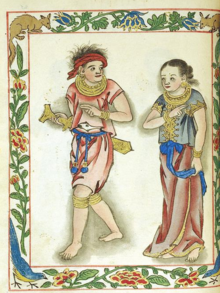
Back البيسان Arabic ویسایالار AZB Mga Bisaya BCL Bisaya CEB مردم ویسایا Persian Visayat Finnish Bisaya French Վիսայյա Armenian Orang Bisayak ID Tattao a Bisayano ILO
Kabisay-an / Mga Bisaya | |
|---|---|
 A Visayan couple of noble blood, Boxer Codex, ca. 1590 | |
| Total population | |
| 33,463,654[citation needed] | |
| Regions with significant populations | |
| Visayas, large parts of Mindanao, southernmost parts of Luzon, the rest of the Philippines and overseas communities | |
| Languages | |
| Native Bisayan languages Also Filipino • English | |
| Religion | |
| Christianity: Roman Catholic, Aglipayan, Evangelicals, remaining belongs to United Church of Christ in the Philippines, Iglesia ni Cristo; Sunni Islam; Hinduism; Animism and other religions[1] | |
| Related ethnic groups | |
| Tausūg people, Zamboangueño people, Tagalog people, Austronesian people and other Filipinos |
Visayans (Visayan: mga Bisaya; local pronunciation: [bisaˈjaʔ]) or Visayan people are a Philippine ethnolinguistic family group or metaethnicity native to the Visayas, the southernmost islands of Luzon and a significant portion of Mindanao. They are composed of numerous distinct ethnic groups, many unrelated to each other. When taken as a single group, they number around 33.5 million. The Visayans, like the Luzon Lowlanders (Tagalogs, Bicolanos, Ilocanos, etc.) were originally predominantly animist-polytheists and broadly share a maritime culture until the 16th century when Catholicism was introduced by the Spanish empire. In more inland or otherwise secluded areas, ancient animistic-polytheistic beliefs and traditions either were reinterpreted within a Roman Catholic framework or syncretized with the new religion. Visayans are generally speakers of one or more of the distinct Bisayan languages, the most widely spoken being Cebuano, followed by Hiligaynon (Ilonggo) and Waray-Waray.[2]
- ^ "Central Visayas: Three in Every Five Households had Electricity (Results from the 2000 Census of Population and Housing, NSO)". National Statistics Office, Republic of the Philippines. July 15, 2003. Archived from the original on February 21, 2012. Retrieved September 4, 2012.
- ^ Lifshey, A. (2012), The Magellan Fallacy: Globalization and the Emergence of Asian and African Literature in Spanish, Ann Arbor, MI: University of Michigan Press
© MMXXIII Rich X Search. We shall prevail. All rights reserved. Rich X Search